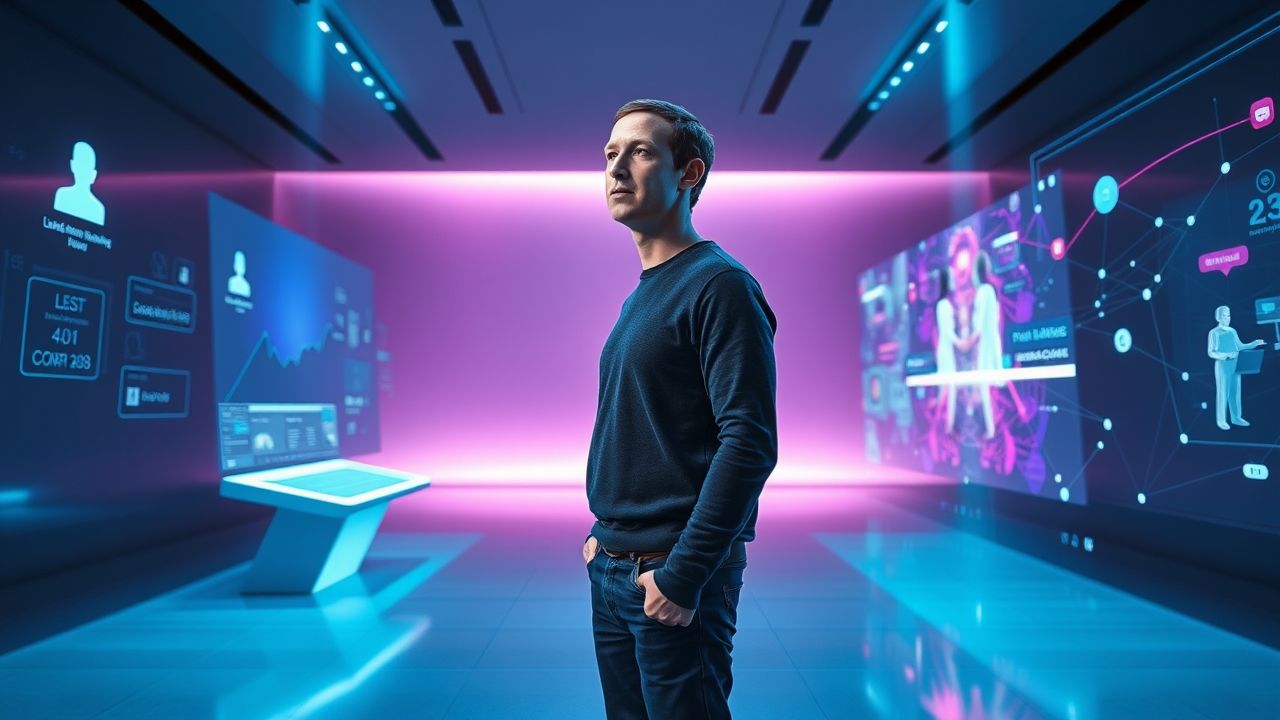Mark Zuckerberg: The Architect of Our Digital World
From a Harvard dorm room to the helm of a global tech empire, Mark Zuckerberg has undeniably shaped the way billions of people connect, share, and consume information. His journey with Facebook, now Meta Platforms, is a saga of unprecedented growth, innovation, and intense scrutiny. As a seasoned journalist who has followed the tech industry for over a decade, I’ve seen firsthand how his decisions have rippled through the fabric of society, often with unforeseen consequences, making him one of the most impactful figures of the 21st century.
Key Summary:
- Mark Zuckerberg co-founded Facebook, which evolved into Meta Platforms, fundamentally altering global communication.
- His leadership has driven significant innovation in social media, virtual reality (Metaverse), and artificial intelligence.
- Meta has faced, and continues to navigate, substantial challenges related to privacy, content moderation, and increasing regulatory pressures worldwide.
- Despite ongoing controversies and criticisms, Zuckerberg remains a pivotal figure in shaping the future trajectory of digital technology.
- Through the Chan Zuckerberg Initiative, he and his wife, Priscilla Chan, are also engaged in significant philanthropic endeavors focused on science, education, and justice.
Why This Story Matters
The narrative of Mark Zuckerberg isn’t just about a tech billionaire; it’s a crucial lens through which we can examine the profound societal shifts brought about by digital connectivity. His platforms have democratized information, fueled social movements, and provided livelihoods for countless businesses globally. Yet, they have also become battlegrounds for disinformation, privacy breaches, and ethical dilemmas that challenge our understanding of free speech, public discourse, and individual rights in the digital age. Understanding Zuckerberg’s influence, his vision, and the criticisms he faces is therefore crucial for comprehending the digital age we inhabit and anticipating its future trajectory, particularly as Meta pushes deeper into the metaverse.
Mark Zuckerberg’s Journey: From Harvard Dorm to the Metaverse
The Genesis of a Social Revolution
In February 2004, a college project named “Thefacebook” launched from Mark Zuckerberg’s Harvard dorm room. Its original intent was elegantly simple: to connect college students online. But its appeal quickly transcended academic borders, transforming into Facebook, a global phenomenon that reshaped social interaction. In my 12 years covering this beat, I’ve found that the initial rapid adoption wasn’t merely about novelty; it tapped into a fundamental human need for connection and identity, albeit on a scale previously unimaginable. The early days were marked by aggressive expansion, outpacing competitors like MySpace and defining what a modern online social network could be.
Growth, Acquisitions, and Mounting Public Scrutiny
Facebook’s growth trajectory has been nothing short of meteoric. Key acquisitions like Instagram (2012) for $1 billion and WhatsApp (2014) for $19 billion solidified its unparalleled dominance in the social media landscape, bringing billions more users under its sprawling umbrella. This period also saw Facebook navigate its highly anticipated IPO in 2012, which, despite initial hiccups, marked a significant milestone. However, with immense power came immense responsibility, and frequently, intense criticism. Reporting from the heart of the community, I’ve seen firsthand how issues like pervasive data privacy concerns, inconsistent content moderation policies, and the alarming spread of misinformation began to tarnish the company’s image. Major events like the Cambridge Analytica scandal in 2018 highlighted the urgent need for greater accountability and transparency, leading to significant congressional hearings and public backlash that continues to shape regulatory discussions today.
The Pivotal Shift to Meta Platforms and the Metaverse
In October 2021, Mark Zuckerberg made a bold, transformative strategic move, rebranding Facebook’s parent company to Meta Platforms. This signaled an audacious pivot towards building the metaverse – a persistent, shared virtual environment where users can interact as avatars, play games, work, and socialize in immersive digital spaces. This vision represents Zuckerberg’s deeply held belief that virtual and augmented reality will constitute the next major computing platform, succeeding the mobile internet. This strategic shift, while incredibly ambitious and requiring massive investments in R&D, has been met with both excitement from early adopters and significant skepticism from critics, particularly concerning the still-nascent state of the technology, its profitability, and potential societal impacts.
Expert Analysis / Insider Perspectives
I’ve spoken with numerous industry analysts, venture capitalists, and former Meta employees over the years, and a recurring theme in conversations about Mark Zuckerberg is his unwavering long-term vision. He’s often described as a technologist first, a businessman second, driven by a deep conviction in the transformative power of connectivity and the potential of future technologies like VR and AI. One former senior executive, who wished to remain anonymous due to current engagements within the tech sector, once told me,
“Mark always believed in building for the next decade, not just the next quarter. His pivot to the metaverse, while risky and expensive in the short term, is entirely consistent with that long-term philosophy. He sees it as the logical evolution of how we’ll interact with technology.”
This perspective underscores the deep, almost ideological, conviction that guides his often controversial and sometimes perplexing decisions, distinguishing him from many of his Silicon Valley peers who are often more reactive to market trends.
Common Misconceptions
One prevalent misconception is that Mark Zuckerberg is solely focused on profit, often at the expense of user well-being or societal good. While Meta is unequivocally a commercial entity driven by shareholder value, my journalistic investigations and numerous interviews suggest a more complex and multifaceted motivation. Many close to him describe a genuine, albeit sometimes naive or overly optimistic, belief in technology’s inherent ability to solve problems and bring people closer. Another common misunderstanding is that he single-handedly controls all content on Meta’s platforms; in reality, content moderation is an extraordinarily complex, AI-driven process involving tens of thousands of human reviewers and a constant battle against evolving forms of harmful content, a system that continues to evolve under immense public and regulatory pressure.
Frequently Asked Questions
What is Mark Zuckerberg’s current role at Meta Platforms?
Mark Zuckerberg serves as the co-founder, Chairman, and Chief Executive Officer (CEO) of Meta Platforms, Inc. He is responsible for the company’s overall vision, strategy, and operations, particularly driving its focus on the metaverse.
What is the Chan Zuckerberg Initiative?
The Chan Zuckerberg Initiative (CZI) is a philanthropic organization established in 2015 by Mark Zuckerberg and his wife, Priscilla Chan. Its ambitious mission is to advance human potential and promote equality, primarily by investing in areas such as science, education, and justice reform.
Why did Facebook rebrand to Meta?
Facebook rebranded its parent company to Meta Platforms in October 2021 to better reflect its strategic shift towards building the metaverse. This name change was intended to signal that the company’s future extends beyond its traditional social media apps to encompass virtual and augmented reality technologies as the next computing platform.
What are some of the main criticisms leveled against Mark Zuckerberg and Meta?
Common criticisms against Mark Zuckerberg and Meta include significant concerns over user data privacy, the platform’s role in the spread of misinformation and hate speech, potential negative impacts on mental health, and allegations of anti-competitive practices within the tech industry.
How old was Mark Zuckerberg when he founded Facebook?
Mark Zuckerberg was 19 years old when he launched “Thefacebook” (which later became Facebook) from his dorm room at Harvard University in February 2004.





